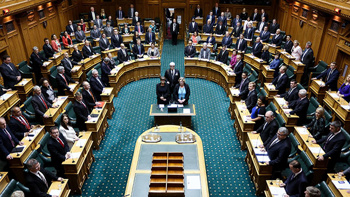"The difference between students at the top and the bottom is deeply entrenched. We've barely nudged it in 20 years."
While New Zealand's overall results had stabilised, our long-term achievement performance was declining.
Jones said this likely reflected more behavioural problems, bullying and falling attendance figures.
"If you're not there, you're not getting access to the curriculum and you're not learning."
The most "troubling" development was declining attitudes towards reading, with more than half of surveyed New Zealand kids saying they only read if they have to, and 43 per cent not reading for enjoyment.
Anecdotally, this reflected kids spending more time on devices and the internet, and less time reading books.
Children's sense of belonging was also flagged in the report, with more students feeling lonely, awkward or "like an outsider" at school - possibly linked to social media.
/arc-anglerfish-syd-prod-nzme.s3.amazonaws.com/public/XOBIKDFWZVFCXO6MRLCAQFXRR4.jpg)
The Pisa study is conducted every three years and considered the most robust international comparison of reading, maths and science abilities.
Jones said the findings would help shape education policy, for instance how to counter persistent bullying rates.
"Fifteen per cent of 15-year-olds report being frequently bullied – double the OECD average.
"That is very concerning and we all need to do more to address this challenge."
The report also showed more than 80 per cent of students were proficient in reading, meaning most kids were gaining critical literacy skills.
"That's great but we have many challenges to address. An increasing number of learners even in senior secondary level are struggling with their reading and there is a particularly strong relationship between socio-economic disadvantage and achievement in New Zealand."
The ministry was investing in children's literacy and strengthening parents' ability to read at home which was crucial to kids' literacy development.
Judge Becroft said the bullying statistics were a national disgrace.
A co-ordinated governmental response was needed, rather than leaving the problem to "well-meaning boards of trustees".
"If ever there was a clarion call for action, this is it."
He said the worrying proportion of students failing at school was closely linked to child poverty.
"We've got to lift achievement for all New Zealand children. Although we do well internationally, that hides the fact there's a group for whom we need to do much better."
/arc-anglerfish-syd-prod-nzme.s3.amazonaws.com/public/ZORY4OHX55ETTOBCT3CIPPPCWU.jpg)
Unite Union national director Mike Treen said the education system was failing disadvantaged communities, setting them up for a lifetime of poverty.
"They'll be stuck in labouring work or fast-food jobs. Usually they are minimum wage."
Education Minister Chris Hipkins said the report showed national standards had been a failure.
The Government was developing tools to properly measure student progress and making changes to Tomorrow's Schools to address bullying by creating safe and inclusive schools.
NZ PISA RESULTS
• NZ students rank seventh in OECD for science (up from 12th in 2015).
• NZ students rank eighth in OECD for reading (up from 10th in 2015).
• NZ students rank 22nd in OECD for maths (down from 21st in 2015).
• The average reading score for NZ students was 506, above OECD average of 487.
• The average science score for NZ students was 508, above OECD average of 489.
• The average maths score for NZ students was 494, above OECD average of 489.
• 32 per cent of NZ students reported being bullied at least a few times a month, compared to 23 per cent OECD average.
• 29 per cent of NZ students had skipped a day's school and 48 per cent had arrived late in the last fortnight.
• 18 per cent of students felt lonely at school, compared to OECD average of 16 per cent.
A STUDENT'S PERSPECTIVE
She's still in year 10 but Min Angh Tran has already sat NCEA Level 1 maths a year earlier than most kids her age.
The 15-year-old is in an accelerated maths class at Western Springs College.
While yet to decide on a career, she's toying with medicine, architecture, interior design or dance.
Min said she'd had a good year and was looking forward to tackling more NCEA papers next year.
"It's fun. The schoolwork isn't that stressful. There's not too much homework if you can manage your time."
While many Kiwi students report bullying at school, Min said she hadn't encountered it but would step in if she saw a classmate being bullied "to help them find a solution".
"Personally, I don't think I've ever been bullied. Certainly there are mean people but I wouldn't consider that bullying."
In terms of educational achievement, she knew some students were weren't motivated at school. Others had learning disabilities like dyslexia which affected their learning.
Every student had potential, she believed, but some struggled in the traditional classroom environment.

/arc-anglerfish-syd-prod-nzme.s3.amazonaws.com/public/75FF2775CVEYTNBE2ILEGZRH7A.jpg)
/arc-anglerfish-syd-prod-nzme.s3.amazonaws.com/public/Q5S5JALB5JAJ7PUTURC7FSNEE4.jpg)








